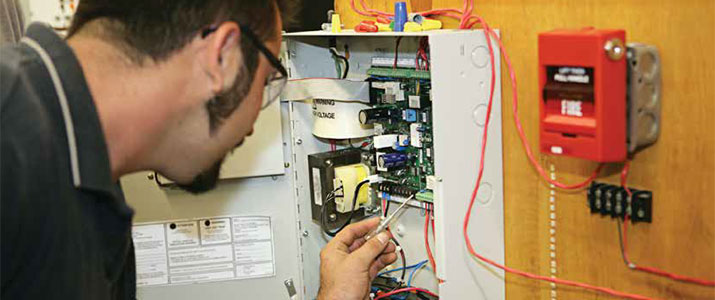
Train Well, and Often
How to succeed within the fire alarm market
- By Beth Welch
- Mar 04, 2014
 Training is an essential priority for any
security dealer or integrator seeking
to enter the fire alarm market, while
continuing education is important for
dealers who already install fire alarms systems.
Training provides important continuing education
units (CEUs) to keep employees’ industry
certifications up-to-date as well as information
about industry changes.
Training is an essential priority for any
security dealer or integrator seeking
to enter the fire alarm market, while
continuing education is important for
dealers who already install fire alarms systems.
Training provides important continuing education
units (CEUs) to keep employees’ industry
certifications up-to-date as well as information
about industry changes.
Trends toward the use of fire alarm systems that
incorporate mass notification, carbon monoxide
(CO) detection and IP or cellular communication
require fire alarm technicians to update their skills
to accommodate the expanded functionality of
these new technologies. More Authorities Having
Jurisdiction (AHJs) are requiring voice evacuation
in larger facilities, and the latest editions of the
National Fire Protection Association (NFPA) 72:
National Fire Alarm and Signaling Code contain
a lengthy chapter of prescribed requirements for
emergency communication systems.
Keeping staff up-to-date and informed about
market trends and technical changes can enable
dealers to maximize their business, meet the increasing
demand for these systems, and stay on top
of today’s and tomorrow’s trends.
Training Options
Many training courses qualify attendees for CEUs
that may be required as well as fire alarm, lowvoltage
and/or electrical licenses. Fire alarm systems
training helps dealers meet CEU requirements
and maintain their certifications at a low
cost. Requirements for CEUs vary by location and
certification but could specify a general mandate,
such as 16 hours of continuing education every
two years.
It is recommended that dealers within the fire
alarm market have staff that is certified by the National
Institute for Certification in Engineering Technologies (NICET). Available sources of training include the Electronic
Security Association’s (ESA) National Training School (NTS), the American
Fire Alarm Association (AFAA), and many other not-for-profit organizations
that provide classroom and online courses for the evolving electronic security
and life safety industry.
In-person programs. Many get their training from manufacturers, who
tend to offer a variety of training curriculum delivered in a number of ways
at little-to-no cost. Manufacturer-supplied training can cover subject matter
from fire alarm basics to sophisticated applications design and programming.
This training includes plenty of in-person opportunities that are especially
useful when learning hands-on skills related to the installation, programming
and maintenance of a specific brand of fire alarm system.
For example, a training class might teach an attendee how to install, program
and service a 25-point addressable system including installing the hardware,
connecting the system and troubleshooting. The manufacturer might
provide addressable systems, smoke detectors, pull stations, relays, annunciators
and other equipment for the training session, and attendees might work
in teams to install the systems during a course. It is truly a hands-on experience
and offers a great forum for new and seasoned technicians.
Online programs. In addition to in-person training, some manufacturers
have taken to the Web to provide a range of training options from Webinars—
both live and on-demand—to video demonstrations of installation
basics. Most online training resources are free, and some provide certificates
for those who complete a Web-based course. Online courses are also a good
resource to gain familiarity with basic fire alarm terminologies before attending
a more technical or hands-on course, as well as a simple, no-cost way of
getting administrative and other office staff more informed.
Online training offers dealers an opportunity to become educated about
fire alarm systems before they commit to enter the market and without investing
in travel or other expenses. How-to videos on various manufacturers’
websites and YouTube cover general topics such as programming a system,
checking battery voltage, aligning a beam detector and synchronizing notification
appliance circuits. Usually under three minutes and easily searchable,
these videos can help installers get quick clarification on a common, technical
support issue and limit wasted labor time.
On-site programs. Security equipment distributors, electrical wholesalers
and other suppliers also play a large role in training their local dealers and
integrators. These trainings can be technical in nature, but suppliers have become
very proficient at teaching the features and benefits of a product from a
sales perspective—a benefit to technicians and salespeople alike.
Suppliers often provide on-site programs about the fire alarm market to
dealers interested in entering the sector. “Getting Into Fire” is one such program
that Fire-Lite Alarms offers through its various suppliers. These types of
introductory courses open doors to new opportunities for dealers, providing
details on technology, business development and marketing options. Attending
these courses allows new dealers to better understand the challenges and
opportunities involved.
Courses, Content and Attendance
Providing training to the marketplace represents a substantial investment for
fire alarm manufacturers. For example, Silent Knight provides more than 50
hands-on courses per year, keeping three trainers busy traveling the country
providing a one-day introductory course and a two-day advanced, hands-on,
technical course. The two-day training offers more in-depth programming and
overall system troubleshooting for experienced installers while covering some
of the latest software tools this particular manufacturer makes available for free
on its website. Interest in new technologies, such as carbon monoxide detection
and emergency voice systems, also appear to be driving up attendance.
Another manufacturer, Fire-Lite Alarms, trains about 2,000 attendees annually
and is seeing registrations increase as well. Dealers are showing interest
in learning more about newer IP and cellular fire alarm communicators as
well as mass notification systems. Fire-Lite is reportedly developing a new
course on mass notification—a hot topic in the marketplace, especially in the
hospitality, multi-dwelling and education markets.
Although local jurisdictions often have specific fire alarm requirements,
national codes, such as those prescribed by the NFPA, are typically touched
upon in trainings. Manufacturers like Fire-Lite Alarms and Silent Knight have
traditionally offered brief overviews on new or upcoming fire alarm mandates
through a combination of seminars, webinars and/or whitepapers. Local
AFAA chapters are another good source of information on new codes, as is
the local AHJ, which will be ensuring system compliance. Keeping up-to-date
with code requirements is an essential aspect of the fire alarm market, and
training is one of the best ways to stay abreast of the changes.
Attendees at these trainings are mostly people who install, program and
maintain solutions, but fire marshals and other local authorities many times
attend as well to learn about new products and gain a more thorough understanding
of what is being installed in the field. Smart dealers make sure
their sales staff is also trained to improve their product knowledge and respond
effectively to customer needs. No matter what a person’s role is within
an organization, it is highly valuable to have the basic knowledge of fire alarm
systems and aligned technologies to best serve customers.
Knowledge Provides Opportunity
Knowledge is power, and various forms of training are great tools to empower
current fire alarm dealers, security dealers and integrators to take advantage of
growing business within the fire alarm market. Fire alarm systems can also be
a good recurring revenue source on the monitoring side of a dealer’s business.
Training provides a direct route to success within a market that is full of
opportunity. Every building needs a fire alarm system, so knowledge about installing
and servicing the latest technologies can help expand a dealer’s current
customer base while increasing business prospects with existing customers.
This article originally appeared in the March 2014 issue of Security Today.